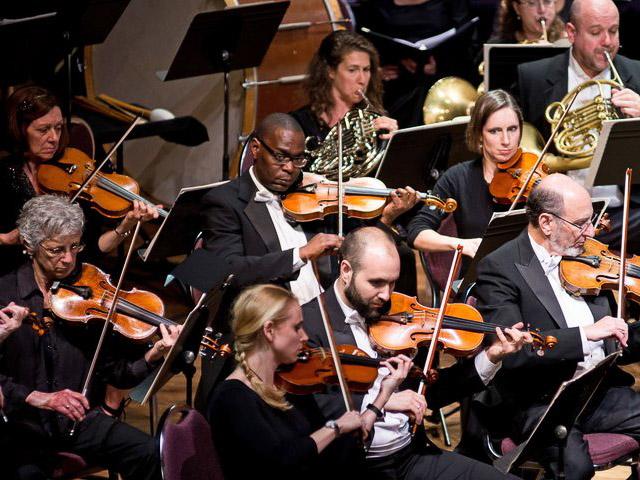It may have been “Appalachian Spring” inside the vaulted sanctuary of Easton’s Church of God Thursday evening, where the Mid-Atlantic Symphony Orchestra performed Vivaldi, Dvorak, Haydn and Copland classics, but temperatures dove into the frost-warning 30s as a few hundred music appreciators stepped out into the damp night air.
They had just been warmed and, at times, entranced by the chamber orchestra rendition of the title-piece finale of the concert. In his later years, Aaron Copland said he preferred the intimate chamber arrangement of his most beloved musical composition as opposed to the full orchestral suite to which we are accustomed. For the MSO, the choice of playing it chamber-style presented a pair of advantages—one artistic, the other financial. Obviously, it’s less expensive to perform a concert with 16 musicians compared to 37 in September’s season-opening concert.
To make the evening artistically successful, music director Julien Benichou selected a program altogether fitting for a chamber orchestra. The concert opened with Vivaldi’s Concerto for Two Cellos in G minor, a  Baroque gem from the Venetian-born master. But just before Maestro Benichou took the stage, it was announced that the church’s newly acquired “piano” was actually an electronic keyboard instrument that could also be played in piano mode. Its versatility was deployed most effectively in the Vivaldi piece, which calls for a clavichord in the second-movement Adagio. The sound emanating from the keyboard resembled that of the more familiar harpsichord, also a staple of the Baroque period. It fit appropriately with the lyrical conversation between cello soloists Daniel Gaisford and Jacques-Pierre Malan, both drawn from the MSO roster of accomplished string musicians.
Baroque gem from the Venetian-born master. But just before Maestro Benichou took the stage, it was announced that the church’s newly acquired “piano” was actually an electronic keyboard instrument that could also be played in piano mode. Its versatility was deployed most effectively in the Vivaldi piece, which calls for a clavichord in the second-movement Adagio. The sound emanating from the keyboard resembled that of the more familiar harpsichord, also a staple of the Baroque period. It fit appropriately with the lyrical conversation between cello soloists Daniel Gaisford and Jacques-Pierre Malan, both drawn from the MSO roster of accomplished string musicians.
The second piece, Dvorak’s “String Serenade,” suggests just that—a serenade by a suitor endeavoring to impress a young lady with soulful ardor. The second movement imagines the couple dancing together in a waltz. A lively scherzo imagines—wishful thinking, perhaps?—a celebratory wedding dance, while the more formal fourth movement snaps back to reality, a descending three-note phrase repeated over and over, as if to remind the suitor that his dream is not yet realized. The final Allegro in sonata form suggests three themes of this unresolved, if not unrequited romance, leaving it to us to decide how it turns out. Uncommonly melodic, the serenade is performed with crisp and soaring effectiveness by the nine-violin ensemble, led by concertmaster Kurt Nikkanen, buttressed by reflective bass, cello, and viola notes.
Following intermission, piano soloist Didier Castell-Jacomin performed Haydn’s Piano Concerto No. 11 in  D major, which could easily be mistaken for a Mozart composition. Haydn met Mozart around the time this concerto was written and befriended the young genius. The first movement introduces a theme presented by the strings and further developed by the pianist, which Castell-Jacomin carries out with deft precision, further explored in a teasing tickle of the keys in the next movement. Eastern European dance motifs supply ample opportunity for the soloist to display his skills, though much of the concerto is in the higher end of the scale. Castell-Jacomin took the opportunity to show a greater range in a bonus performance of a Chopin etude. However, the limitations of the piano mode of the electronic device became apparent in reverberations in the lower registers.
D major, which could easily be mistaken for a Mozart composition. Haydn met Mozart around the time this concerto was written and befriended the young genius. The first movement introduces a theme presented by the strings and further developed by the pianist, which Castell-Jacomin carries out with deft precision, further explored in a teasing tickle of the keys in the next movement. Eastern European dance motifs supply ample opportunity for the soloist to display his skills, though much of the concerto is in the higher end of the scale. Castell-Jacomin took the opportunity to show a greater range in a bonus performance of a Chopin etude. However, the limitations of the piano mode of the electronic device became apparent in reverberations in the lower registers.
In “Appalachian Spring,” the instrument was put to better use, filling in with percussive notes effectively, as the piano soloist himself gamely filled in as sheet-music page-turner. Commissioned as a ballet for Martha Graham, “Spring” tells the story of a Pennsylvania farmer and his bride. Alternating slow and fast dance movements culminate in the Shaker melody to “The Gift to Be Simple,” one of the most emotively beautiful passages in American classical music. Muted strings bring “Appalachian Spring” to a prayerful close. Led by an animated Benichou, the MSO chamber musicians played as one, and with far greater power than you would anticipate from a small ensemble.
Appalachian Spring
Program: Dvorak’s “String Serenade,” Vivaldi’s Two-Cello Concerto, Haydn’s Piano Concerto in D major, Copland’s “Appalachian Spring”
Upcoming performances: 3 p.m. Saturday, Nov. 9, Ocean View Church of Christ, 55 West Ave., Ocean View, DE, 3 p.m. Sunday, Community Church, Route 589 and Race Track Road, Ocean Pines
Tickets: Click here or call 888-846-8600
Steve Parks is a retired journalist, arts critic and editor now living in Easton.



Write a Letter to the Editor on this Article
We encourage readers to offer their point of view on this article by submitting the following form. Editing is sometimes necessary and is done at the discretion of the editorial staff.